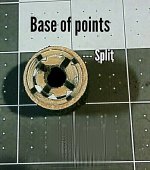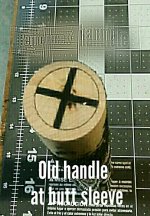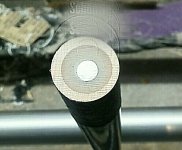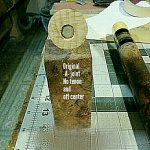It's a very addicting craft. Lol4-5 forearms.
Yeah that's why I'm thinking vibration. Hopefully soon I'll get it sorted
You are using an out of date browser. It may not display this or other websites correctly.
You should upgrade or use an alternative browser.
You should upgrade or use an alternative browser.
Points / Veneers: Customer being to picky?
- Thread starter be1163
- Start date
You mention "doing your final taper is when things get changed"? Are speaking of the point alignment or something else?My mount is from Chris but essentially the same set-up.
When I'm cutting forearms I'll do 4-5 at a time and for the most part their spot on, my problem is once I've put the entire butt together and doing my final taper is when things get changed. I use a mid-america lathe with auto feed which does a pretty good job but I think vibration is the biggest problem
If your points are even when you are done inlaying them into the forearm they should stay that way if your attachment to the handle has no run out. The other thing would be your center hole at the joint end of the forearm has moved or been modified somehow in the process and this will cause an uneven step.
You mention vibration being the biggest problem. This could be caused by a number of things in the set up. One of the easiest ways to find out what that may be is start a process of elimination. Only change one thing at time to verify what or where it may be.
I would start with changing out the cutter to a different style and making sure it is sharp and lined up correctly.
No changes in your end result, change it back to your original and try one other thing different.
I've at times spent half a day or longer chasing things that weren't finishing out the way I liked them to.
GL with your chase.
PracticeChampion
Well-known member
Bought some stuff just to do tips for myself, fast forward couple years and thousands of dollars later and here I amIt's a very addicting craft. Lol
PracticeChampion
Well-known member
Thanks....You mention "doing your final taper is when things get changed"? Are speaking of the point alignment or something else?
If your points are even when you are done inlaying them into the forearm they should stay that way if your attachment to the handle has no run out. The other thing would be your center hole at the joint end of the forearm has moved or been modified somehow in the process and this will cause an uneven step.
You mention vibration being the biggest problem. This could be caused by a number of things in the set up. One of the easiest ways to find out what that may be is start a process of elimination. Only change one thing at time to verify what or where it may be.
I would start with changing out the cutter to a different style and making sure it is sharp and lined up correctly.
No changes in your end result, change it back to your original and try one other thing different.
I've at times spent half a day or longer chasing things that weren't finishing out the way I liked them to.
GL with your chase.
Really that's what I need to do, spend a day or 5 if needed figuring it out
It only gets worse. 28 yrs later I'm still buying and adding to the inventory of "stuff" that I need or may need in the future!Bought some stuff just to do tips for myself, fast forward couple years and thousands of dollars later and here I am
Your not done spending yet.Bought some stuff just to do tips for myself, fast forward couple years and thousands of dollars later and here I am
Lmao
Last edited:
Take the time nowThanks....
Really that's what I need to do, spend a day or 5 if needed figuring it out
Or
What's the Title of this Thread again?
C"mon in
The water is fine!
Jerry Rauenzahn told me a long time ago that uneven points are a sign the cue maker didn’t just rely on CNC cuts.
It was not uncommon for George Balabushka’s pool cue points not to be perfectly symmetrical. This indicated the
cue maker was performing hands on completion of the cue design instead of just programming the design. Uneven
points do not bother me in the slightest if the points have syringe like sharp tips. Of course, the points must be close.
It was not uncommon for George Balabushka’s pool cue points not to be perfectly symmetrical. This indicated the
cue maker was performing hands on completion of the cue design instead of just programming the design. Uneven
points do not bother me in the slightest if the points have syringe like sharp tips. Of course, the points must be close.
George cut Points?Jerry Rauenzahn told me a long time ago that uneven points are a sign the cue maker didn’t just rely on CNC cuts.
It was not uncommon for George Balabushka’s pool cue points not to be perfectly symmetrical. This indicated the
cue maker was performing hands on completion of the cue design instead of just programming the design. Uneven
points do not bother me in the slightest if the points have syringe like sharp tips. Of course, the points must be close.
I heard there were about 5 soup to nuts Cues, but they're not marked. I would love to see
Vee points
This is the ultimate test for everything in your Cue construction after the Points are installed.
Drilling, boring, handle attachment.
From the Butt bottom to the Joint screw, to sanding and finishing. If something is off, it will effect the points being even or not.
Whether you make your own blanks, or buy them, whether it's short spliced or full spliced.
You must follow the path of everything being true. The most common problem, starts at the -A- joint.
This is the ultimate test for everything in your Cue construction after the Points are installed.
Drilling, boring, handle attachment.
From the Butt bottom to the Joint screw, to sanding and finishing. If something is off, it will effect the points being even or not.
Whether you make your own blanks, or buy them, whether it's short spliced or full spliced.
You must follow the path of everything being true. The most common problem, starts at the -A- joint.
Attachments
Last edited:
DeeDeeCues
Well-known member
Jerry Rauenzahn told me a long time ago that uneven points are a sign the cue maker didn’t just rely on CNC cuts.
It was not uncommon for George Balabushka’s pool cue points not to be perfectly symmetrical. This indicated the
cue maker was performing hands on completion of the cue design instead of just programming the design. Uneven
points do not bother me in the slightest if the points have syringe like sharp tips. Of course, the points must be close.
I think you misunderstood what Jerry was saying.
Cnc inlay points are generally cut by CNC as a pocket of uniform depth. They will be uniform height despite the problems mr. Webb shows above.
Half-splice points are cut at a slope in the forearm and any of the things shown in Mr. Webb's photos will make the points very uneven, regardless of hand work or CNC. The half splice points are always cut with either a taper bar or CNC. There is no way that a person could tell which method was used to cut the splice after it is done. Cnc or taper bar cut points will both be uneven height if the forearm isn't running truly centered for the final cut.
I won't speak about full splice until I've made a couple of blanks, hopefully soon.
I completely agree with you, a small amount of height difference shouldn't be a deal breaker, if all else is good.
We should also stop referring to CNC inlays shaped like points as points.
Drop pocket points just wouldn't sound so good. LolI think you misunderstood what Jerry was saying.
Cnc inlay points are generally cut by CNC as a pocket of uniform depth. They will be uniform height despite the problems mr. Webb shows above.
Half-splice points are cut at a slope in the forearm and any of the things shown in Mr. Webb's photos will make the points very uneven, regardless of hand work or CNC. The half splice points are always cut with either a taper bar or CNC. There is no way that a person could tell which method was used to cut the splice after it is done. Cnc or taper bar cut points will both be uneven height if the forearm isn't running truly centered for the final cut.
I won't speak about full splice until I've made a couple of blanks, hopefully soon.
I completely agree with you, a small amount of height difference shouldn't be a deal breaker, if all else is good.
We should also stop referring to CNC inlays shaped like points as points.
With one simple comment Michael Webb sends the Z man to the sidelines. Well done!Hmmmm. Happy Monday.
Can we see some of your Cues you've made Please?
I sure didn't mean too.With one simple comment Michael Webb sends the Z man to the sidelines. Well done!
Points and veneers are one of the least participated threads on this Forum.
Which is Hilarious because
EVERYONE loves points and veneers In a Cue!
I've spent years studying point and veneer work and the variables that exist from one Cue maker to another.
Veneering. Whether they're .mitered or overlapped.
It fascinates me.
But on this Forum it's overlooked!
I know the real answer, I'm just to nice to say it!
TOTALLY stumps me!!!!
I owned one of Skip Weston’s nicest cues. It was featured on the cover page of his website. Always thought his veneers and points were outstanding.I sure didn't mean too.
Points and veneers are one of the least participated threads on this Forum.
Which is Hilarious because
EVERYONE loves points and veneers In a Cue!
I've spent years studying point and veneer work and the variables that exist from one Cue maker to another.
Veneering. Whether they're .mitered or overlapped.
It fascinates me.
But on this Forum it's overlooked!
I know the real answer, I'm just to nice to say it!
TOTALLY stumps me!!!!
I also appreciate your willingness to discuss and share your knowledge.
DeeDeeCues
Well-known member
Prototype points, came out okay, learned a few things. Finish isn't complete.
Skips re-milled points were and are the nuts.I owned one of Skip Weston’s nicest cues. It was featured on the cover page of his website. Always thought his veneers and points were outstanding.
I also appreciate your willingness to discuss and share your knowledge.
Second to none!
Get'er done. Looks great!View attachment 763729
Prototype points, came out okay, learned a few things. Finish isn't complete.
DeeDeeCues
Well-known member
Get'er done. Looks great!
Thank-you, sir!
Still want to shoot
Well-known member
That is really awesome. I'm sitting here looking at all the angles and how it comes together. I don't know exactly what i am looking at as a non cue builder. But I assume what i am seeing is red paper? outlining the white maple. it makes for a very eye pleasing effect creating a diamond at the point. If the light maple veneer was thinner would it look even nicer? but then it would mess with the angles of how the diamond looks at the top.View attachment 763729
Prototype points, came out okay, learned a few things. Finish isn't complete.
Also everyone try not to jump down my throat, I'm just spitballing. I think this work is amazing, and i could not do it.



